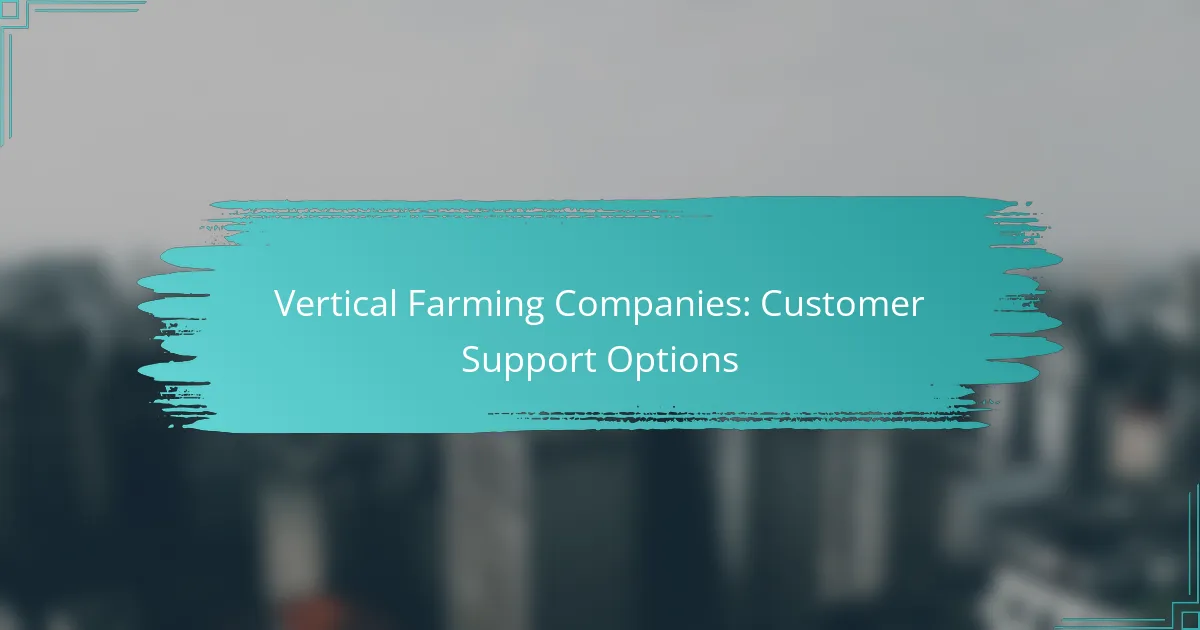Vertical farming companies offer a variety of customer support options to ensure clients receive the assistance they need for their systems and operations. Support channels typically include live chat, email, phone assistance, on-site help, and remote troubleshooting, catering to different preferences and urgency levels. By utilizing these resources, customers can effectively address their concerns and enhance their farming experience.

What customer support options do vertical farming companies offer?
Vertical farming companies typically provide a range of customer support options to assist clients with their systems and operations. These options include live chat, email, phone support, on-site assistance, and remote troubleshooting, ensuring that customers can receive help in a manner that suits their needs.
Live chat support
Live chat support allows customers to engage with support representatives in real-time through the company’s website. This option is often available during business hours and can provide immediate assistance for common issues or questions. It is particularly useful for quick inquiries, as response times are usually within minutes.
Email support
Email support is a standard option where customers can send detailed inquiries or issues to the company’s support team. While response times can vary, many companies aim to reply within 24 to 48 hours. This method is beneficial for complex problems that require thorough explanations or documentation.
Phone support
Phone support offers direct communication with customer service representatives, allowing for immediate dialogue about issues. This option is ideal for urgent matters or when customers prefer speaking to someone directly. Availability may vary, so checking the support hours is essential.
On-site assistance
On-site assistance involves sending a technician to the customer’s location to address specific issues with the vertical farming system. This service is often available for installation, maintenance, or troubleshooting complex problems. Companies may charge a fee for this service, depending on distance and the nature of the visit.
Remote troubleshooting
Remote troubleshooting enables support teams to access the customer’s system remotely to diagnose and resolve issues. This method is efficient and can significantly reduce downtime, as technicians can often identify and fix problems without needing to be physically present. Customers should ensure they have a reliable internet connection for this service to be effective.

How do vertical farming companies ensure customer satisfaction?
Vertical farming companies prioritize customer satisfaction through various strategies, including gathering feedback and implementing loyalty programs. These approaches help them understand customer needs and foster long-term relationships.
Feedback surveys
Feedback surveys are a crucial tool for vertical farming companies to gauge customer satisfaction and identify areas for improvement. By regularly distributing surveys, companies can collect valuable insights on product quality, delivery times, and overall service experience.
These surveys can be conducted through online platforms, email, or even in-person interactions. Companies often incentivize participation with discounts or rewards, encouraging more customers to share their opinions.
Customer loyalty programs
Customer loyalty programs are designed to reward repeat customers and enhance their overall experience with vertical farming companies. These programs typically offer benefits such as discounts, exclusive access to new products, or points that can be redeemed for future purchases.
Implementing a loyalty program can significantly boost customer retention. For instance, a company might offer a 10% discount for every fifth purchase, which not only incentivizes repeat business but also fosters a sense of community among customers.

What are the best practices for contacting vertical farming companies?
To effectively contact vertical farming companies, utilize multiple channels such as their official websites, social media platforms, and dedicated support portals. Each method offers unique advantages, allowing you to choose the most suitable option based on your needs and urgency.
Using official websites
Official websites of vertical farming companies typically provide essential contact information, including email addresses, phone numbers, and sometimes live chat options. Check the ‘Contact Us’ section for direct lines to customer support or inquiry forms.
When using official websites, ensure you provide clear and concise information about your query or issue. This will help the support team address your concerns more efficiently. Additionally, look for FAQs or resource sections that may answer your questions without needing direct contact.
Social media engagement
Engaging with vertical farming companies on social media can be an effective way to get quick responses. Platforms like Twitter, Facebook, and LinkedIn often have active customer service representatives who monitor inquiries and comments.
When reaching out via social media, keep your messages brief and to the point. Tag the company in your posts or comments to increase visibility. Be aware that response times can vary, so for urgent matters, consider using other contact methods as well.
Utilizing support portals
Many vertical farming companies offer support portals that provide a centralized location for customer inquiries, troubleshooting, and resources. These portals often include ticketing systems where you can submit detailed requests and track their status.
Before submitting a ticket, search the portal for existing solutions or community forums that might address your issue. This can save time and provide immediate assistance. Make sure to include all relevant details in your request to facilitate a quicker resolution.

Which vertical farming companies excel in customer support?
Several vertical farming companies stand out for their exceptional customer support, focusing on responsiveness, accessibility, and user satisfaction. Companies like AeroFarms, Plenty, and Bowery Farming prioritize customer engagement through various channels, ensuring that clients receive timely assistance and valuable resources.
AeroFarms
AeroFarms is known for its robust customer support system, which includes a dedicated help center and responsive customer service team. They offer multiple contact methods, such as email, phone, and live chat, ensuring that customers can easily reach out for assistance.
The company also provides extensive online resources, including FAQs, troubleshooting guides, and instructional videos, which help users maximize their experience with AeroFarms’ products. This proactive approach to support is crucial for both novice and experienced vertical farmers.
Plenty
Plenty excels in customer support by offering personalized assistance and a user-friendly online platform. Their customer service representatives are trained to address a wide range of inquiries, from technical issues to product recommendations.
Additionally, Plenty hosts regular webinars and workshops that educate customers about their systems and best practices in vertical farming. This commitment to customer education enhances user satisfaction and fosters a strong community around their products.
Bowery Farming
Bowery Farming places a strong emphasis on customer support through its dedicated account management system. Each client is paired with an account manager who provides tailored advice and support, ensuring that their specific needs are met.
Moreover, Bowery offers a comprehensive online resource library that includes guides, case studies, and troubleshooting tips. This wealth of information empowers customers to effectively utilize their vertical farming systems and troubleshoot common issues independently.

What are the common customer support challenges in vertical farming?
Vertical farming companies often face challenges in customer support that can hinder effective service delivery. These challenges include technical knowledge gaps among support staff and delays in response times, both of which can impact customer satisfaction and operational efficiency.
Technical knowledge gaps
Technical knowledge gaps occur when customer support representatives lack the necessary expertise to address specific issues related to vertical farming systems. This can lead to inadequate troubleshooting and unresolved customer inquiries, which may frustrate users and diminish trust in the company.
To mitigate this issue, companies should invest in comprehensive training programs for support staff that cover the intricacies of vertical farming technology, including hydroponics, aeroponics, and system maintenance. Regular updates and refresher courses can help keep the team informed about new developments and best practices.
Response time delays
Response time delays can significantly affect customer satisfaction in vertical farming. Customers expect timely assistance, and prolonged wait times can lead to dissatisfaction and potential loss of business. Companies should aim for response times within a few hours for urgent issues and no longer than a day for less critical inquiries.
To improve response times, vertical farming companies can implement ticketing systems that prioritize urgent requests and streamline communication channels. Utilizing chatbots for initial inquiries can also help reduce wait times, allowing human representatives to focus on more complex issues.

How can vertical farming companies improve their customer support?
Vertical farming companies can enhance their customer support by focusing on staff training and leveraging technology like AI chatbots. These strategies not only streamline communication but also ensure customers receive timely and accurate assistance.
Training support staff
Training support staff is crucial for vertical farming companies to provide effective customer service. Staff should be well-versed in the specific technologies and processes used in vertical farming, enabling them to address customer inquiries with confidence and expertise.
Regular training sessions can include product knowledge, troubleshooting techniques, and customer interaction skills. This ensures that support staff can handle a variety of issues, from technical problems to general inquiries, improving overall customer satisfaction.
Implementing AI chatbots
Implementing AI chatbots can significantly enhance customer support for vertical farming companies. These chatbots can handle common queries 24/7, providing instant responses and freeing up human agents for more complex issues.
When designing a chatbot, it’s essential to program it with a wide range of FAQs related to vertical farming, such as growing conditions, pest management, and product availability. This can reduce response times to just a few seconds, improving the customer experience and allowing for more efficient support operations.
